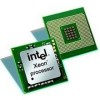Intel X5472 Specification Update - Page 24
Returning to Real Mode from SMM with EFLAGS.VM Set May Result in, CMPSB, LODSB
 |
UPC - 735858201551
View all Intel X5472 manuals
Add to My Manuals
Save this manual to your list of manuals |
Page 24 highlights
AX22. Performance Monitoring Events for Retired Instructions (C0H) May Not Be Accurate Problem: The INST_RETIRED performance monitor may miscount retired instructions as follows: • Repeat string and repeat I/O operations are not counted when a hardware interrupt is received during or after the last iteration of the repeat flow. • VMLAUNCH and VMRESUME instructions are not counted. • HLT and MWAIT instructions are not counted. The following instructions, if executed during HLT or MWAIT events, are also not counted: a) RSM from a C-state SMI during an MWAIT instruction. b) RSM from an SMI during a HLT instruction. Implication: There may be a smaller than expected value in the INST_RETIRED performance monitoring counter. The extent to which this value is smaller than expected is determined by the frequency of the above cases. Workaround: None identified. Status: For the steppings affected, see the Summary Tables of Changes. AX23. Returning to Real Mode from SMM with EFLAGS.VM Set May Result in Unpredictable System Behavior Problem: Returning back from SMM mode into real mode while EFLAGS.VM is set in SMRAM may result in unpredictable system behavior. Implication: If SMM software changes the values of the EFLAGS.VM in SMRAM, it may result in unpredictable system behavior. Intel has not observed this behavior in commercially available software. Workaround: SMM software should not change the value of EFLAGS.VM in SMRAM. Status: For the steppings affected, see the Summary Tables of Changes. AX24. CMPSB, LODSB, or SCASB in 64-bit Mode with Count Greater or Equal to 248 May Terminate Early Problem: In 64-bit Mode CMPSB, LODSB, or SCASB executed with a repeat prefix and count greater than or equal to 248 may terminate early. Early termination may result in one of the following. • The last iteration not being executed • Signaling of a canonical limit fault (#GP) on the last iteration Implication: While in 64-bit mode, with count greater or equal to 248, repeat string operations CMPSB, LODSB or SCASB may terminate without completing the last iteration. Intel has not observed this erratum with any commercially available software. Workaround: Do not use repeated string operations with RCX greater than or equal to 248. Status: For the steppings affected, see the Summary Tables of Changes. AX25. Problem: Implication: Writing the Local Vector Table (LVT) when an Interrupt is Pending May Cause an Unexpected Interrupt If a local interrupt is pending when the LVT entry is written, an interrupt may be taken on the new interrupt vector even if the mask bit is set. An interrupt may immediately be generated with the new vector when a LVT entry is written, even if the new LVT entry has the mask bit set. If there is no Interrupt Service Routine (ISR) set up for that vector the system will GP fault. If the ISR does Intel® Xeon® Processor 5400 Series 24 Specification Update















